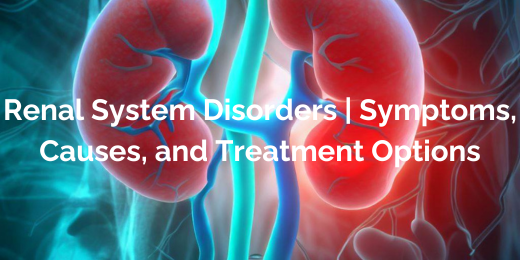Importance of the renal system
The renal system is a crucial component of the human body that removes waste and excessive fluids. When the renal system fails to operate properly, it can result in various disorders that pose significant health risks. In this blog, we will examine some of the most common renal system disorders, including their symptoms, causes, and treatments. We will also emphasise the importance of the renal system and how to maintain its health.
Introduction
Components of the renal system, which is also known as the urinary system, include the kidneys, ureters, bladder, and urethra. The kidneys are responsible for removing waste and excess fluids from circulation. These filtrated waste products and fluids are then eliminated from the body via urine.
In addition, the renal system contributes to electrolyte balance maintenance, blood pressure regulation, and the production of red blood cells. Consequently, it is essential to understand the importance of the renal system and properly care for it.
Common Renal System Disorders
The renal system is susceptible to a wide range of diseases, any of which, if left untreated, can lead to severe health complications for the patient. Among the most common conditions affecting the renal system are the following:
Chronic Kidney Disease (CKD): It is a disorder that develops when the kidneys are unable to eliminate waste and extra fluid from the bloodstream efficiently. Common causes of this condition include diabetes, high blood pressure, and several other untreated medical conditions.
Kidney stones: They are minute, solid deposits that, as they travel through the urinary tract, can cause excruciating pain. These stones are composed of calcium oxalate and form in the kidneys.
Urinary tract infections (UTIs): They result from an infection that is brought on by bacteria in the urinary tract. This condition is characterised by lower abdominal pain, frequent urination, and pain or burning sensations during urination.
Glomerulonephritis: It is a condition characterised by inflammation of the glomeruli, the microscopic blood vessels of the kidney responsible for removing waste products from the blood. Potential causes of this sickness include infections, immune system disorders, and other underlying medical conditions.
Symptoms of Renal System Disorders
The symptoms of renal system abnormalities might vary depending on the type and degree of the disorder. Typical signs and symptoms include:
- Lower back or abdominal pain or discomfort
- Frequent urination
- Blood in the urine
- Swelling in the legs, ankles, or feet
- Fatigue or weakness
- Nausea or vomiting
- Difficulty sleeping
- High blood pressure
If you possess any of these signs, you should immediately see a doctor to determine the cause and receive the appropriate care.
Causes of Renal System Disorders
A variety of factors can cause renal system abnormalities. Some of the most common are hypertension, diabetes, infections, and medications. High blood pressure can harm kidney blood vessels, impairing their ability to filter waste from the blood. Diabetes may also contribute to diabetic nephropathy, a condition characterised by renal damage.
Infections such as pyelonephritis can cause kidney inflammation and impair their function. If taken over an extended time or in excess, several medications, like nonsteroidal anti-inflammatory drugs (NSAIDs), could also harm the kidneys.
Treatment Options for Renal System Disorders
The exact cause of the disorder determines the treatment choices for renal system problems. For example, the doctor may recommend blood pressure medication if the disorder is caused by high blood pressure. If the disorder is caused by diabetes, blood sugar levels may need to be controlled with diet and medication. Surgery may sometimes be required to clear clogs or rectify urinary tract abnormalities.
Aside from medical treatment, changing one’s lifestyle can help manage renal system problems. This may entail eating a nutritious diet, drinking plenty of water, exercising regularly, and abstaining from alcohol and tobacco. In certain instances, alternative therapies, such as acupuncture or herbal remedies, can be beneficial.
Prevention of Renal System Disorders
Although preventing renal system problems can be difficult, you can take some steps to minimise your risk of having them. Kidney disorders can be avoided by not taking certain medicines, keeping a healthy weight, controlling blood pressure and blood sugar, staying hydrated, and keeping blood pressure and blood sugar at the right levels. Regular doctor visits can also aid in the detection and treatment of any problems.
Conclusion
The renal system is crucial for maintaining our bodies’ health; disorders of this system can have devastating effects. You can protect your kidney health and avoid consequences by understanding the signs, causes, and treatment choices for renal system illnesses.
If you have any renal system disorder indications, you should immediately consult a doctor. Many kidney disorders can be properly treated and controlled with proper treatment, allowing you to enjoy a full and healthy life.



